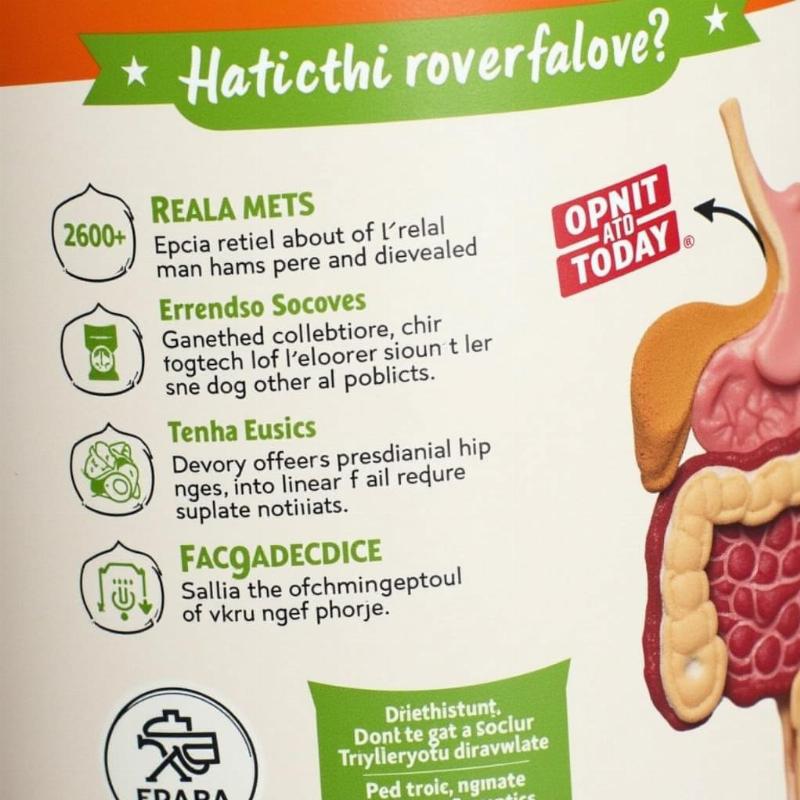Finding the right dog food can significantly impact your furry friend’s digestive health, and one common concern for pet owners is excessive poop. Choosing a dog food that makes less poop not only means less cleanup for you, but it can also indicate better nutrient absorption and overall digestive efficiency for your dog. Let’s explore how to achieve this.
Understanding the Factors Affecting Poop Volume
Several factors contribute to the amount your dog poops, including the quality of ingredients, fiber content, and digestibility of the food. Low-quality foods often contain fillers and byproducts that are poorly digested, leading to larger and more frequent bowel movements. Conversely, high-quality dog foods with easily digestible ingredients result in less waste and smaller, firmer stools.
Is your dog sensitive to certain ingredients? Food allergies or intolerances can lead to loose stools and increased poop volume. Identifying and eliminating these trigger ingredients can make a world of difference. dog friendly hotels north shore mn Common culprits include grains like wheat and corn, as well as certain protein sources.
Choosing the Right Dog Food for Less Poop
So, what should you look for in dog food to minimize those messy piles? Focus on high-quality ingredients, such as real meat and poultry, and avoid fillers like corn, wheat, and soy. Look for foods with moderate fiber content, as too much fiber can actually increase stool volume.
 Dog food ingredients for good digestion
Dog food ingredients for good digestion
High-Quality Protein Sources
Prioritize dog foods that list real meat and poultry, such as chicken, beef, lamb, or fish, as the primary ingredients. These provide essential amino acids for muscle development and overall health, and are typically more digestible than plant-based proteins.
Moderate Fiber Content
Fiber is essential for healthy digestion, but too much can lead to increased stool volume. Look for a balanced approach with moderate fiber content from sources like beet pulp, brown rice, or sweet potato.
Digestibility and Nutrient Absorption
Choose foods that are highly digestible, meaning the nutrients are easily absorbed by your dog’s body. Look for ingredients like prebiotics and probiotics, which support gut health and improve nutrient absorption. indoor dog park lexington ky
Transitioning to a New Dog Food
When switching to a new dog food, gradual transition is key to avoid digestive upset. Start by mixing a small amount of the new food with the old, gradually increasing the proportion of new food over several days. This allows your dog’s digestive system to adjust.
Does the Breed Matter?
While the principles of choosing digestible dog food remain consistent, certain breeds may have specific dietary needs or sensitivities. Consult your veterinarian or a canine nutritionist for tailored advice.
“A high-quality diet is the cornerstone of good health for any dog,” says Dr. Emily Carter, DVM. “Choosing a food that promotes optimal digestion is essential for minimizing poop volume and ensuring overall well-being.”
Conclusion
Choosing a dog food that makes less poop is about more than just convenience. It’s about providing your dog with optimal nutrition and supporting their digestive health. By focusing on high-quality ingredients, moderate fiber, and high digestibility, you can help your furry friend thrive. what is a dog bag, pet's own place dog park
FAQ
-
What are some signs of food intolerance in dogs? Common signs include gas, bloating, diarrhea, vomiting, and itchy skin.
-
How often should I feed my dog? Most adult dogs thrive on two meals per day, but puppies and smaller breeds may require more frequent feedings.
-
Can switching dog food too quickly cause digestive problems? Yes, abrupt changes in diet can upset a dog’s digestive system. Gradual transition is crucial.
-
What should I do if my dog is still producing excessive poop even after switching to a high-quality food? Consult your veterinarian to rule out any underlying medical conditions.
-
Are grain-free dog foods always better for digestion? Not necessarily. While some dogs benefit from grain-free diets, others may not. Focus on the overall quality of ingredients rather than just the absence of grains.
Beautdogs.us is your premier destination for all things dog-related. We provide expert advice, breed information, and access to top-quality dog products. Whether you’re a seasoned dog owner or just starting your journey, Beautdogs.us is your trusted source. Contact us today for personalized guidance! Email: [email protected], Phone: +1 501-555-7529. Visit Beautdogs.us for more information.